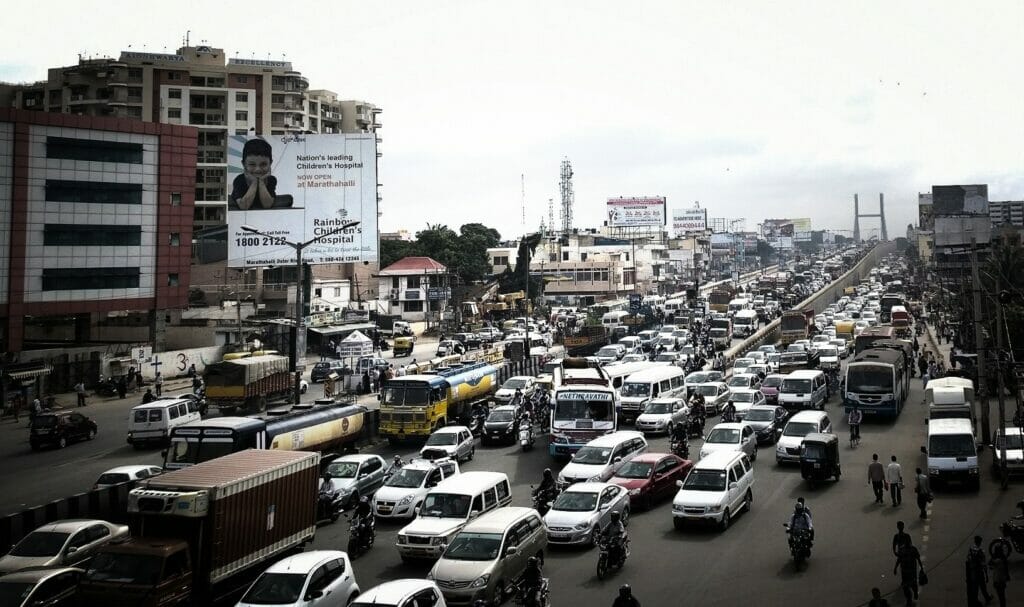The yellow boards on passenger vehicles have outlived their utility and are causing more harm than good. The carpooling controversy in Bengaluru showed our inability to rethink the rules when faced with behaviour that runs contrary to those rules.
Read more: Making carpooling legal in Bengaluru – it’s the centre’s job, not state’s
Over the past few days, newspapers have reported that service providers, which help people discover carpooling passengers via an app and charge for its use, will be slapped with a fine since they use white board (private) vehicles for a commercial purpose. The commerce here is charging for passenger discovery and, possibly, payments between the driver and passengers as well.
Restrictions to carpooling
The current motor vehicle rules permit only vehicles registered as commercial vehicles, which display a yellow number plate, to ply for any kind of exchange of money.
This, however, has not prevented last-mile delivery services from operating with white board private vehicles because the person delivering groceries, packages and food is being paid. An unintended consequence of switching to electric vehicles is that delivery vehicles have been plying with green number plates, as there is no provision for green/yellow combination in the rules.
Historically, auto rickshaws and taxis have been registered with yellow plates. There is an inherent unfairness in this treatment that makes taxis ferrying passengers go through extra norms, forcing them to resist. This has come to the fore with the rise of food delivery services, and now carpooling, as it had with bike sharing services earlier. You don’t see taxi and auto drivers complain against last mile delivery since they don’t take away their passengers.
Traditionally, carpooling was done informally, with friends that you know privately or through word of mouth. However, if one wishes to maximise their car usage, they will look for technologies, like apps, to connect with more people they don’t directly know.
The apps might charge you a service fee to keep themselves going. It is unfair to expect that such services be free. If someone is willing to pay for this, we should allow that transaction to happen and not sit in judgement of the value exchange between the parties. It doesn’t make sense to register your car as a yellow board to help discover more people, only for your commute, while the rest of your use of that vehicle is private.

Read more: 10 things that can declutter the roads and make them safer
A possible solution
One of the ways to get past this is to decouple the vehicle from the driver. The yellow board goes on the vehicle, ostensibly to check its fitness and collect a differentiated tax. However, with the help of technology, it is entirely possible to move these fitness checks to the vehicle service centre.
All vehicles have a fixed schedule provided by the manufacturer and are checked for their fitness in those service appointments. The service centre should be asked to upload the vehicle fitness data onto the transport department’s website at those service checks, or at certain fixed intervals; like how it is done for your income tax, property tax and GST filings. Only exceptions or consumer complaints need to be audited. This removes the need to have an interface with the government authorities and allows the government to do other important things, like building better infrastructure.
The revenue gained from yellow board registrations of passenger vehicles is not significant enough to warrant these complications. We aren’t talking about cargo or goods transport vehicles here.
The other reason for yellow boards is to certify and do constant checks on the driver, to prevent untoward incidents involving passengers. However, untoward incidents are occurring even with the yellow board. It is also observed that in many cases, the driver of the vehicle is not even the owner of the vehicle.
The Metro Mitra Auto service, recently launched in Bengaluru, has a QR code which informs passengers of the credentials of the driver whose KYC is done. The taxi and auto rickshaws already display driver information, either in the app or in the vehicle. The enablers of passenger discovery via technology for carpooling could also be asked to perform KYC on the drivers and display the details prominently on the app, or physically in the vehicle.
Each time we try to put a covering legislation like aggregator rules etc. on the fundamental flaws of the underlying act, it is only a band aid that leads to more exceptions. Transport regulation is in the concurrent list. In case any state wants to take up such fundamental reforms, they can request that the Central Motor Vehicle Act allows the State Motor Vehicle Act to override these rules. It is also important to note that Unified Metropolitan Transport Authorities, like the BMLTA in Bengaluru, should be taking up these reforms.
By decoupling the driver and colour of the number plate on the vehicle, we can arrive at solutions that enable innovation to solve the broader problem of congested roads. So, it is essential to question some of the rules made in a different era. #NoMoreYellowBoards for passenger vehicles is a useful call to consider.
[This article has been republished with the author’s permission, with minimal edits]
There are green board vehicles with yellow numbers. This is the category which is Electric transport vehicles.